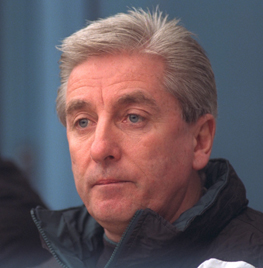- Home /
- History /
- Past Managers /
- Roy Evans

Date of Birth
4 Oct 1948
Birthplace
Bootle
Nationality
English
Games
226
Games Won
117
Games Drawn
56
Games Lost
53
Staff Honours
Coca Cola Cup 1995
Profile
In August 1974 Liverpool made an addition to their backroom staff that led chairman John Smith to say: "We have not made an appointment for the present but for the future. One day Roy Evans will be our manager."
It was a bold statement but one that would ultimately come true - albeit 30 years later.
Back in '74 the idea to promote the 25-year-old Evans to the role of reserve team coach was the brainchild of Bob Paisley who, following Bill Shankly's shock resignation, persuaded the left-back to swap the hallowed turf of Anfield for the all-knowing walls of the Boot Room.
It was an inspired move and one that would ultimately prove to be the making of him.
Roy's love affair with the club had begun back in 1965 when he signed as an apprentice. It was a dream come true for the young full-back, although he would go on to make just 11 first-team appearances before moving into the dugout.
In his first season in charge of the reserves he led them to the Central League Championship, a feat he would achieve a remarkable seven times in nine seasons.
His ability and success as a coach was there for all to see and so it came as no surprise when he was promoted to the senior coaching staff when Joe Fagan took over from Bob Paisley.
More silverware would follow, first with smoking Joe and a magnificent treble in 1983-84, before the domestic double of 1986 under Kenny Dalglish.
Managers came and went but Roy remained, and in 1993 he was installed as assistant to Graeme Souness, a move that would pave the way for him to finally become Reds boss in his own right.
Souey parted company with the club less than a year later and Evans' appointment as his replacement was greeted with great enthusiasm by fans and everyone associated with the Reds. After all, Roy represented a return to the Boot Room tradition and was, as Chairman David Moores put it, 'the last of the Shankly lads'.
The final months of the 1993-94 season saw Liverpool finish in a disappointing eighth position, although supporters were well aware that Evans could not be judged until he had the chance to stamp his own identity upon the side.
With talented youngsters in the shape of Steve McManaman and Robbie Fowler, Evans knew he had players capable of restoring the glory days back to Liverpool but also realised that the defence had been a major cause for concern throughout his predecessor's reign at the club.
He set about remedying this by strengthening the Reds' rearguard with big money moves for defenders Phil Babb and John Scales and deploying a new 3-5-2 formation.
It was a wise decision as a young Liverpool side began to enhance their reputation as one of the best footballing sides in the country, capping a fine first full season in charge for Evans with a Coca-Cola Cup triumph over Bolton at Wembley and a fourth placed finish.
Expectation had gone up a notch and was heightened even further by the summer acquisition of Nottingham Forest's exciting forward Stan Collymore for a club record fee.
The enigmatic frontman would go on to forge a sensational strike partnership with Robbie Fowler as Liverpool made a brief challenge for the title before finishing in, an improved, third position in the Premier League.
However, a disappointing FA Cup final defeat against Manchester United meant the Reds would end the season empty-handed.
The following season a serious assault on the championship was predicted and it proved to be the case up until late March, when the Reds suffered a bout of the title jitters which would ultimately see them finish in a disappointing fourth place.
There would be more frustration a year later and despite another top three finish the Anfield hierarchy felt changes were needed.
At the start of the 1998-99 season the Reds unveiled Gerard Houllier as a joint manager alongside Evans, who to his great credit, reacted to the decision with dignity and class.
However, it was the beginning of the end and after a run of indifferent results he parted ways with the club on November 12, 1998 - just four months into the new campaign.
It brought to a close a 32-year association with the club. His time as manager did not reap the haul of trophies he would have hoped for, but his success in nurturing local talents like Fowler and McManaman and the way he restored Liverpool's reputation as a force to be reckoned with, will always be appreciated.






















